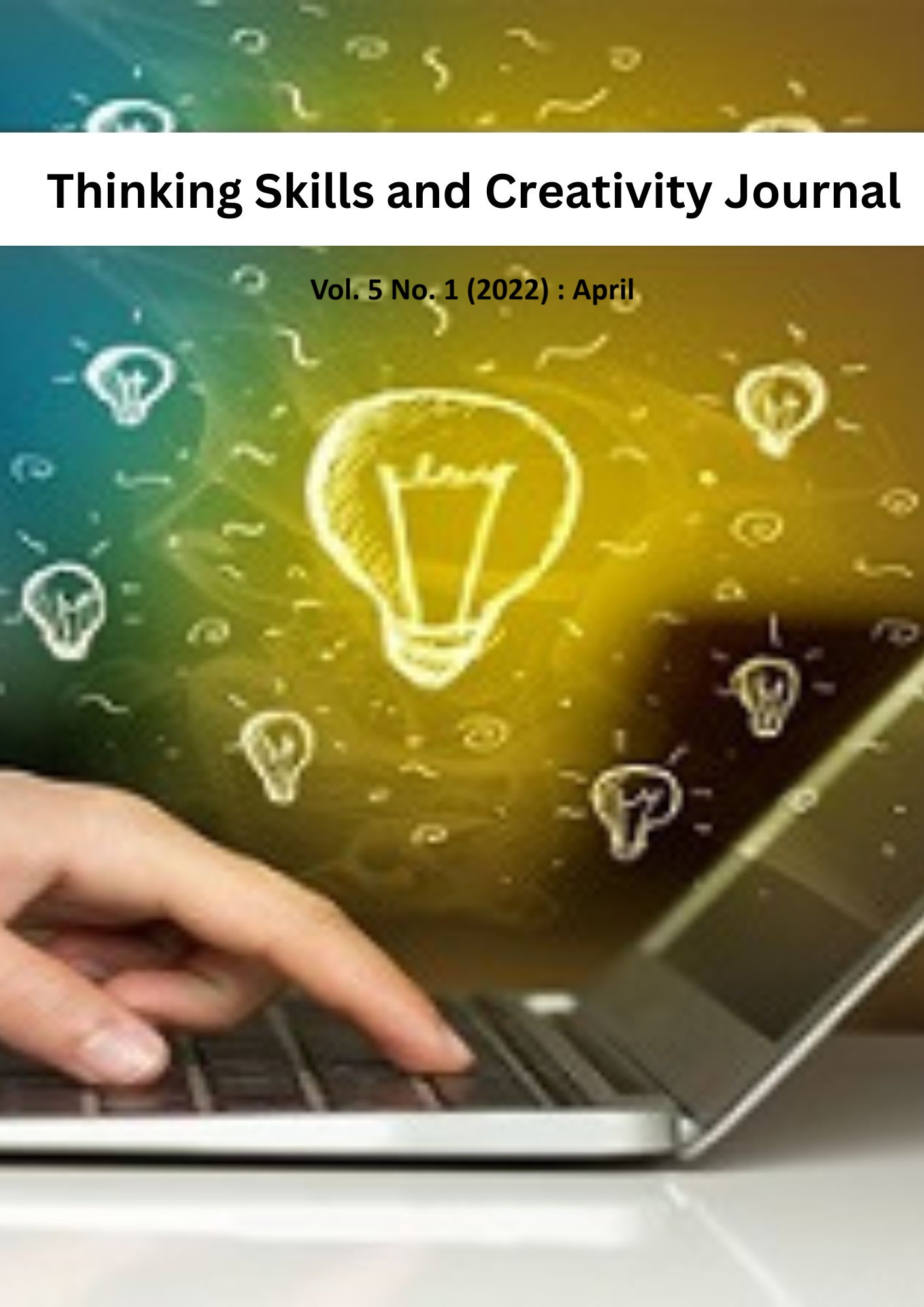The Relationship Between Learning Styles and Cognitive Competencies in Biology Learning
DOI:
https://doi.org/10.23887/tscj.v5i1.37933Keywords:
Relationship, Learning Style, Cognitive CompetenceAbstract
The problem often faced in the learning process is the low learning outcomes obtained by students. One of the factors that influence student learning outcomes is learning style. The observations show that teachers rarely use varied learning methods, models, and media. At the time of learning, each student did not understand their learning style (modality). It can cause an imbalance between students' learning styles and the models, methods, or learning media used by the teacher, causing low cognitive competence in students. This study analyzes the relationship between students' learning styles and cognitive competence. This research is a descriptive study. The total sample is 121 students—data collection techniques using learning outcomes tests, questionnaires, and documentation. Data analysis in this study used the Pearson Product Moment correlation formula. Correlation testing is done by using the t formula to determine whether the correlation coefficient is significant or not. The percentage contribution of students' learning styles on students' cognitive competence was analyzed using determinant coefficients. Based on the research that has been done, it is found that there is no significant correlation between learning styles and students' cognitive competencies. The dominant learning style is the visual learning style, then the kinesthetic learning style, and the least is the auditory learning style. This study concludes that there is no significant relationship between learning styles and students' cognitive competencies.
References
Ardianto, D., & Rubini, Bi. (2016). Literasi Sains Dan Aktivitas Siswa Pada Pembelajaran Ipa Terpadu Tipe Shared. USEJ - Unnes Science Education Journal, 5(1), 1167–1174. https://doi.org/10.15294/usej.v5i1.9650.
Fadhilaturrahmi, F., Ananda, R., & Yolanda, S. (2021). Persepsi Guru Sekolah Dasar terhadap Pembelajaran Jarak Jauh di Masa Pandemi Covid 19. Jurnal Basicedu, 5(3), 1683–1688. https://doi.org/10.31004/basicedu.v5i3.1187. DOI: https://doi.org/10.31004/basicedu.v5i3.1187
Gunawan, G., Harjono, A., & Imran, I. (2016). Pengaruh Multimedia Interaktif Dan Gaya Belajar Terhadap Penguasaan Konsep Kalor Siswa. Jurnal Pendidikan Fisika Indonesia, 12(2), 118–125. https://doi.org/10.15294/jpfi.v12i2.5018. DOI: https://doi.org/10.15294/jpfi.v12i2.5018
Handini, D., Gusrayani, D., & Panjaitan, R. L. (2016). Penerapan Model Contextual Teaching And Learning Meningkatkan Hasil Belajar Siswa Kelas IV pada Materi Gaya. Jurnal Pena Ilmiah, 1(1), 451–460. https://doi.org/10.23819/pi.v1i1.2974.
Hapsari, G. P. P., & Zulherman, Z. (2021). Pengembangan Media Video Animasi Berbasis Aplikasi Canva untuk Meningkatkan Motivasi dan Prestasi Belajar Siswa. Jurnal Basicedu, 5(4), 2384–2394. https://doi.org/10.31004/basicedu.v5i4.1237. DOI: https://doi.org/10.31004/basicedu.v5i4.1237
Hendriana, E. C. (2018). Pengaruh Model Pembelajaran Problem Based Learning Dan Gaya Belajar Auditorial Terhadap Hasil Belajar Ips Di Sekolah Dasar. Jurnal Pendiidikan Dasar Indonesia, 3(1), 1 – 8. https://doi.org/10.26737/jpdi.v3i1.484. DOI: https://doi.org/10.26737/jpdi.v3i1.484
Ilhami, T., & Ristiono, R. (2021). Hubungan Gaya Belajar dan Kompetensi Kognitif Peserta Didik dalam Pembelajaran Biologi. Journal for Lesson and Learning Studies, 4(3), 315–322. https://doi.org/10.23887/jlls.v4i3.37325. DOI: https://doi.org/10.23887/jlls.v4i3.37325
Kurniaman, O., & Noviana, E. (2017). Penerapan Kurikulum 2013 Dalam Meningkatkan Keterampilan, Sikap, Dan Pengetahuan. Primary: Jurnal Pendidikan Guru Sekolah Dasar, 6(2), 389. https://doi.org/10.33578/jpfkip.v6i2.4520. DOI: https://doi.org/10.33578/jpfkip.v6i2.4520
Lee, T. T., & Osman, K. (2012). Interactive Multimedia Module in the Learning of Electrochemistry: Effects on Students’ Understanding and Motivation. Procedia - Social and Behavioral Sciences, 46, 1323–1327. https://doi.org/10.1016/j.sbspro.2012.05.295. DOI: https://doi.org/10.1016/j.sbspro.2012.05.295
Lubis, A. B., Miaz, Y., Taufina, & Desyandri. (2019). Pengaruh Model Everyone Is A Teacher Here Terhadap Aktivitas Dan Hasil Belajar IPS Siswa SD. Jurnal Basicedu, 3(2), 725 – 735. https://doi.org/10.31004/basicedu.v3i2.61. DOI: https://doi.org/10.31004/basicedu.v3i2.61
Maulah, S., A, F. N., & Ummah, N. R. (2020). Persepsi Mahasiswa Biologi terhadap Perkuliahan Daring sebagai Sarana Pembelajaran Selama Pandemi Covid-19. ALVEOLI : Jurnal Pendidikan Biologi, 1(2), 49–61. https://doi.org/10.35719/alveoli.v1i2.6. DOI: https://doi.org/10.35719/alveoli.v1i2.6
Permana, A. (2016). Pengaruh Gaya Belajar dan Motivasi Belajar Mahasiswa Terhadap Kemampuan Belajar Ilmu Alamiah Dasar. Formatif: Jurnal Ilmiah Pendidikan MIPA. https://doi.org/10.30998/formatif.v6i3.999. DOI: https://doi.org/10.30998/formatif.v6i3.999
Putri, F. E., Amelia, F., & Gusmania, Y. (2019). Hubungan Antara Gaya Belajar dan Keaktifan Belajar Matematika Terhadap Hasil Belajar Siswa. Edumatika: Jurnal Riset Pendidikan Matematika, 2(2), 83–88. https://doi.org/10.32939/ejrpm.v2i2.406. DOI: https://doi.org/10.32939/ejrpm.v2i2.406
Sanjaya, B. P. (2021). Kemandirian Belajar Siswa Sekolah Dasar Selama Pembelajaran Daring. Jurnal Inovasi Pendidikan Dasar, 5(2), 71–78. https://doi.org/10.36928/jipd.v5i2.733. DOI: https://doi.org/10.36928/jipd.v5i2.733
Soltani, A., & Askarizadeh, G. (2021). How students’ conceptions of learning science are related to their motivational beliefs and self-regulation. Learning and Motivation, 73, 101707. https://doi.org/10.1016/j.lmot.2021.101707. DOI: https://doi.org/10.1016/j.lmot.2021.101707
Susanti, N. Y., Trapsilasiwi, D., & Kurniati, D. (2015). Analisis Tingkat Kognitif Uji Kompetensi pada Buku Sekolah Elektronik (BSE) Matematika SMP/MTs Kelas VII Kurikulum 2013 Berdasarkan Taksonomi Bloom. Kreano Jurnal Matematika Kreatif-Inovatif, 6(1). https://doi.org/: http://dx.doi.org/10.15294/kreano.v6i1.4509. DOI: https://doi.org/10.15294/kreano.v6i1.4509
Umrana, Cahyono, E., & Sudia, M. (2019). Analisis Kemampuan Pemecahan Masalah Matematis Ditinjau Dari Gaya Belajar Siswa. Jurnal Pembelajaran Berpikir Matematika, 4(1), 67–76. https://doi.org/10.22202/horizon.v1i3.5257. DOI: https://doi.org/10.31002/mathlocus.v1i2.2315
Wahyudi, M., Agung, I. G., & Wulandari, A. (2021). Kontribusi Gaya Kognitif dan Sikap Ilmiah Terhadap Kompetensi Pengetahuan IPA. Jurnal Penelitian Dan Pengembangan Pendidikan, 5(1), 17–25.
Zikri. (2020). Hubungan Gaya Belajar Dan Konsep Diri Terhadap Hasil Belajar Siswa Smk Negeri 3 Solok Selatan. Jurnal Pendidikan Teknologi Dan Kejuruan, 17(2), 135–144. https://doi.org/10.23887/jptk-undiksha.v17i2.24209.








